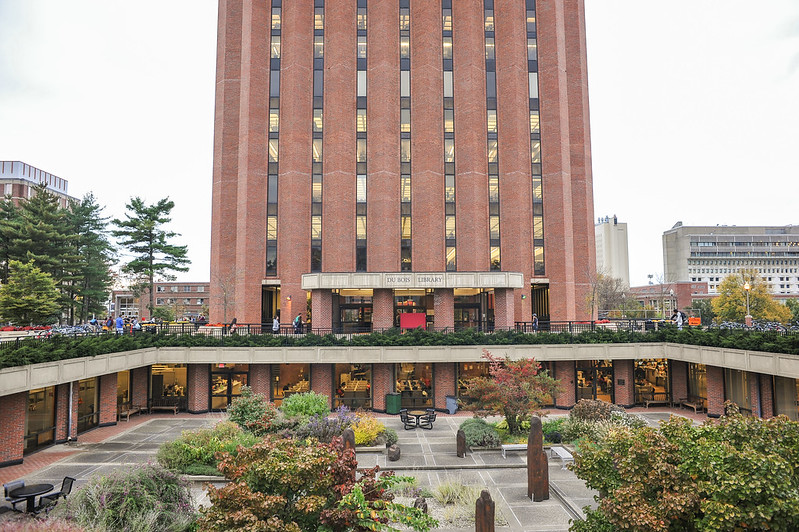With all the news surrounding the resignation of Pope Benedict XVI, religion and in particular the Catholic Church have been the subject of much debate. Benedict XVI was widely considered a conservative Pope (although he was to the left of the Democrats on economic issues and the environment, which says a lot about the Democrats), so there was a lot of criticism of his papacy in progressive circles. But many of my liberal friends went further, and took this opportunity to criticize organized religion itself – a criticism often accompanied by the claim that it is better to be “spiritual but not religious,” or that “faith” is good but organized religion is bad.

Though this is sad, it is not surprising. Polls show that a rapidly growing number of Americans, especially young Americans, claim to be non-religious, but not atheist or agnostic either. These are the “nones”: people who do not wish to identify with any organized religion, but still hold beliefs in the supernatural. They often say that they wanted to free themselves from the constraints of traditional religions. They want to find God (or spirituality) on their own, and they think organized religion is too rigid, dogmatic or illogical.
Now let me be absolutely clear: abandoning organized religion to embrace an ill-defined “spirituality” is a rejection of logic and reason, not an affirmation of it.
Organized religion is organized precisely because it attempts to impose a logical structure and order upon the chaos of personal beliefs. It is a marriage of faith and reason. The Catholic, Orthodox and some Protestant Churches have spent enormous time and effort to construct elaborate doctrines to ensure that their beliefs made logical sense, that they were not contradictory. Those who disparage religious doctrines for being supposedly unscientific are failing to realize that having a doctrine is far more rational than believing whatever feels right to you. The process of creating religious doctrine is one of deduction. If certain premises are true, what conclusions can we logically draw from them? The first part of this process involves faith, and the second part involves reason.
The problem with “spirituality” is that it throws all reason out the window. Rather than accepting a few ideas on faith and then drawing rational conclusions from them, “spirituality” means accepting a wide variety of mutually contradictory ideas from various sources and never thinking too hard about them.
For example, it is popular to say that all religions are just alternative paths to the same destination, or different ways of seeing the same God or the same Truth. This is not just wrong; it is so illogical to such an extent that it could not possibly be true. Different religions make entirely different claims about essential questions of life and death. It’s not just that some religions allow you to eat pork and others don’t. Some religions believe in reincarnation, while others believe in an afterlife, such as heaven and hell. The two cannot be reconciled, and there is no possible middle ground. Your soul can’t be half-reincarnated and half in heaven
Each of the great, organized religions of the world is a self-contained, internally consistent system of thought. What may appear dogmatic at first is simply an attempt to preserve that internal consistency. For example, if you are a Christian, then you cannot believe in reincarnation, fortune telling, or lucky charms, because that would contradict your other beliefs. You also cannot believe that Jesus was only a man, because that would make his death and resurrection, the most important part of the New Testament, entirely pointless.
To hold faith in God or the supernatural, while also “liberating” yourself from the constraints of organized religion, is like trying to build a suspension bridge but “liberating” yourself from the constraints of physics and engineering. The result won’t be an innovative structure that stands as a testament to your free spirit. It will be a tangled mess that will collapse as soon as a strong wind starts blowing.
Do-it-yourself religion is not progressive nor is it a haven for free thought. It is a breeding ground for superstition and fear. It is a throwback to an earlier time in human history, when spiritually free people could simply make up whatever stories they wanted and have people believe them. Today, we have similar examples such as the proliferation of “psychics,” self-improvement “experts,” cult leaders and conspiracy theorists. Do-it-yourself religion is the reason why 46 percent of Americans believe in creationism despite the fact that the vast majority of organized religious institutions (including the Catholic Church) reject it.
Compared to earlier, more disorganized belief systems, organized religion brought us a radically progressive innovation: the idea that religious leaders were no longer allowed to make things up as they went along. Organized religion has holy texts to be read and followed and theological precedents that limit the power of priests in the same way that legal precedents limit the power of judges and lawyers. Organized religion has laws, while “spirituality” is lawless. And, as anyone who has ever lived in a lawless part of the world can tell you, it is far more liberating to live under a system of laws, even bad laws, than to live in a place with no laws at all.
Paradoxically, organized religion was also the mother of atheism. Organized religion nurtured the idea that other religions are wrong, that their gods do not exist. This made it possible for people to imagine that perhaps all religions are wrong, and perhaps no gods exist. In a world filled with “spirituality,” where no one is definitely wrong, where religious beliefs are just a matter of personal opinion and they are all correct in their own way, atheism is almost inconceivable.
I am an Orthodox Christian, but I fully respect and understand the choices made by my friends and others who follow different organized religions, or who are atheists. Those options, organized religion and atheism, are internally consistent and rational systems of thought (note to the skeptic: empirical evidence is a different issue from rationality). If you consider yourself spiritual but not religious, please examine your beliefs more closely, and have the courage to pick a side.
Mike Tudoreanu is a Collegian columnist. He can be reached at [email protected].












Mercurial Quicksilver • Jun 29, 2013 at 7:30 pm
The good kind of spirituality is existentialism. You see yourself in terms of the universe, remembering that in 5000 million years the bodies of us will be exactly as dead, and the earth no better or worse off, then if we never started agriculture. So rather than wasting your quite brief tine being sad about the tiniest most mundane problems, be reverent, or at least content with the luck that you have being one of the comparatively few living objects in the universe.
N. • Apr 3, 2013 at 6:55 pm
er, like opium as much as the next guy, that is.
N. • Apr 3, 2013 at 6:55 pm
Hey, I like opium as much as the next day, but I don’t think he was trying to say anything positive. (I know you don’t have to agree with everything he said, but for someone who very often writes about Marxist ideas you should expect to have other aspects of Marxian thought brought up!) The heart of the heartless world is the heart of heartlessness itself – a metaphysical salve that makes injustice practicable, and provides a kind of template for the concrete way in which the worker’s alienated labor and the products thereof confront her as a hostile force, as ideas which escape the human brain and appear to return as something alien to dominate it from without. I forget which text that’s in, but it’s definitely there…
Gavin Beeker • Mar 9, 2013 at 5:09 am
Mike-
What a lovely article! And finally one I can agree with 🙂 Keep up the great work.
Mike Tudoreanu • Mar 8, 2013 at 4:36 pm
In response to N.: What Karl Marx said about religion is actually more positive than the opinions of present-day atheists like Richard Dawkins. For example, Marx’s most famous quote about religion goes like this:
*
“Religion is the sigh of the oppressed creature, the heart of a heartless world, and the soul of soulless conditions. It is the opium of the people.” (Karl Marx, A Contribution to the Critique of Hegel’s Philosophy of Right)
*
You’d be hard pressed to hear someone like Dawkins calling religion “the heart of a heartless world.” Marx was an atheist, of course, but he had a degree of sympathy for religion. He argued that religion was an inward-looking response to oppression, an idea created by oppressed people to help them cope with the injustice of the world. He opposed it because he argued for an outward-looking response to oppression, in which the workers would actively fight against the injustice of the world. I respect his opinion, but I think he was wrong on this one. I believe that the inward-looking and outward-looking responses to oppression reinforce each other, instead of being in competition.
*
Oh, and by the way, Marxists are not expected to agree with everything Karl Marx ever said. That is not how it works.
Someone • Mar 7, 2013 at 1:26 am
E, there is simply no way that Christianity, Islam, Buddhism, Judaism, etc. could all be true at the same time. No matter how “abhorrent” you might find it, this is a fact. You can say that they are all “paths to the same truth” all you like, that doesn’t make it any less illogical. What exactly do you think that “same truth” could possibly be? Repentance for our sins? No, wait, that’s strictly Christian, and many other religions don’t believe in sin. Following the Five Pillars? Nope, that’s just a Muslim thing. Escaping samsara? No, that’s Buddhist…
The only way to make the whole “paths to the same truth” idea work is to completely ignore the majority of the teachings of the religions in question, and pretend that the only thing they ask people to do is be nice to each other.
There are numerous religions that have incorporated parts of other religions – not just the Baha’i faith or Hinduism, but also Christianity (incorporated Jewish beliefs) and Islam (incorporated Jewish and Christian ideas). But that’s not the same thing as claiming that all religions are paths to the same truth. That’s claiming that ONE religion is correct, and other religions may have gotten a few things right here and there.
N. • Mar 6, 2013 at 8:39 pm
Hey Mike, if you want to talk about cognitive dissonance, maybe you should review what your hero Karl Marx said about religion.
Skeptic of Skeptics • Mar 6, 2013 at 8:23 pm
Hey Skeptic NY: If you are born in Boston you are more likely to believe in evolution than if you are born in Alabama. The belief in X because of circumstances does not make X wrong or right. It has to be evaluated separately.
Observer • Mar 6, 2013 at 6:04 pm
I can’t speak for Mr. Tudoreanu, but tens of thousands of people convert from one religion to another every day. Religion most certainly IS a choice. Here’s what the Pew Research Center has to say about it, in a study of religious conversion in the United States:
http://www.pewforum.org/faith-in-flux.aspx
“Americans change religious affiliation early and often. In total, about half of American adults have changed religious affiliation at least once during their lives.”
E • Mar 6, 2013 at 4:06 pm
I find this article really abhorrent. For one thing, the idea that all religions are paths to the same truth is the basis of some of your respectable organized religions: Unitarian Universalism in particular, and to some degree Baha’i, Hinduism, and various Neopagan and Pantheistic movements. Dismissing that ideology is not dismissing people who don’t identify with a particular tradition, it’s dismissing entire religions because they differ from your own. Which is a pretty awful thing to do, especially as a member of a religion that is privileged in American society (ie Christianity).
That being said, I think there is something to be said against the assimilation of various religions into one mixed spirituality, but it has more to do with problems of cultural appropriation than with their failure to live up to Mike Tudoreanu’s standards of rationality.
Skeptic NY • Mar 6, 2013 at 12:02 pm
An important clarification and distinction needs to be made. Probably the only reason you are a Christian is because of where you were born and who you were born to. It most certainly was NOT a choice.
Brian Westley • Mar 6, 2013 at 9:08 am
“Some religions believe in reincarnation, while others believe in an afterlife, such as heaven and hell. The two cannot be reconciled”
Anything can be reconciled in religion, because you can just make up stuff. Supposed you get reincarnated until you get it “right” enough to make it to heaven (or so wrong you get sent to hell). There, reincarnation AND heave & hell.
“Each of the great, organized religions of the world is a self-contained, internally consistent system of thought”
Many are only made consistent by ignoring parts of it.
“organized religion brought us a radically progressive innovation: the idea that religious leaders were no longer allowed to make things up as they went along. Organized religion has holy texts to be read and followed and theological precedents”
But those holy books were made up too; why go down such a path at all?